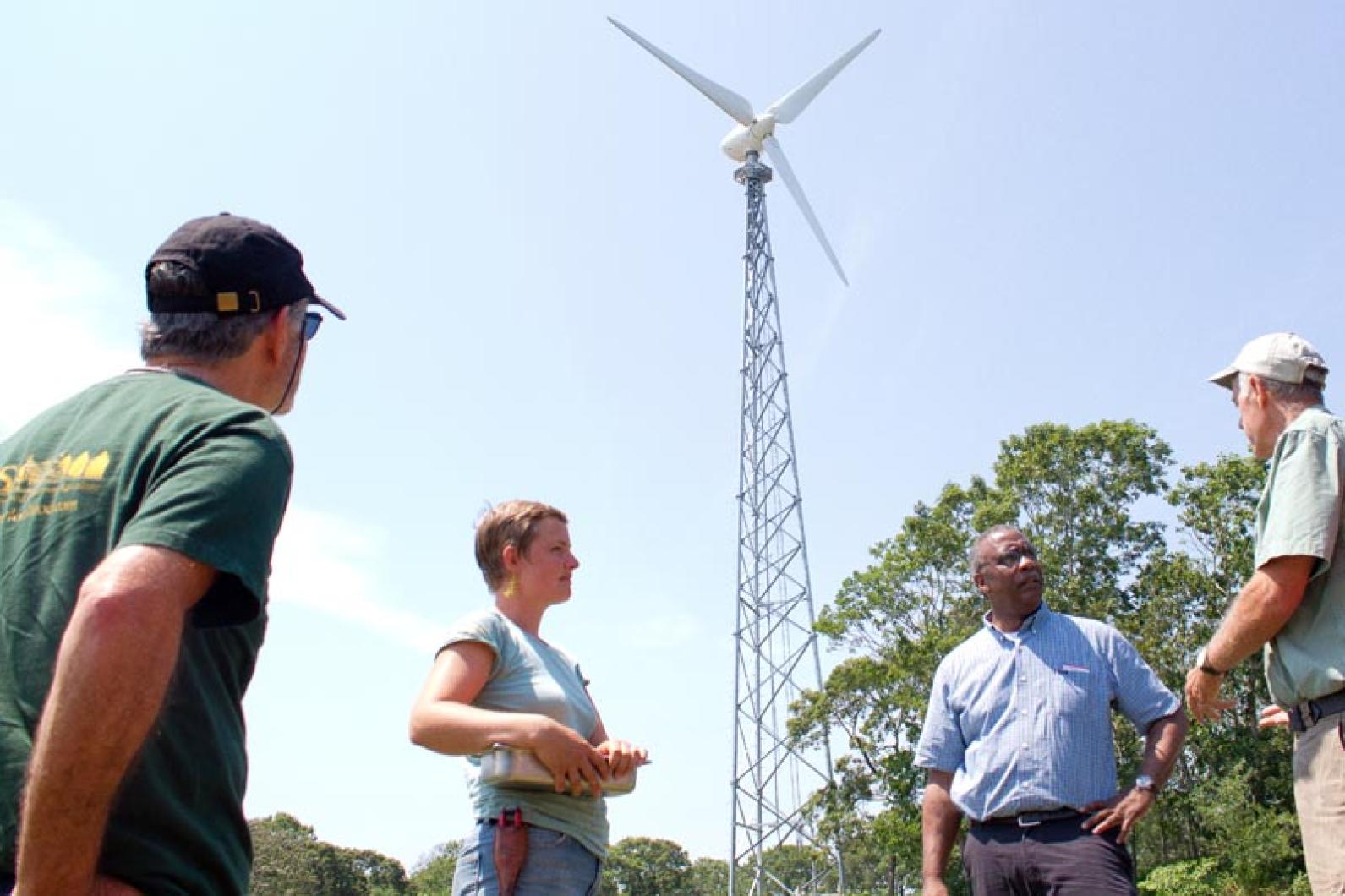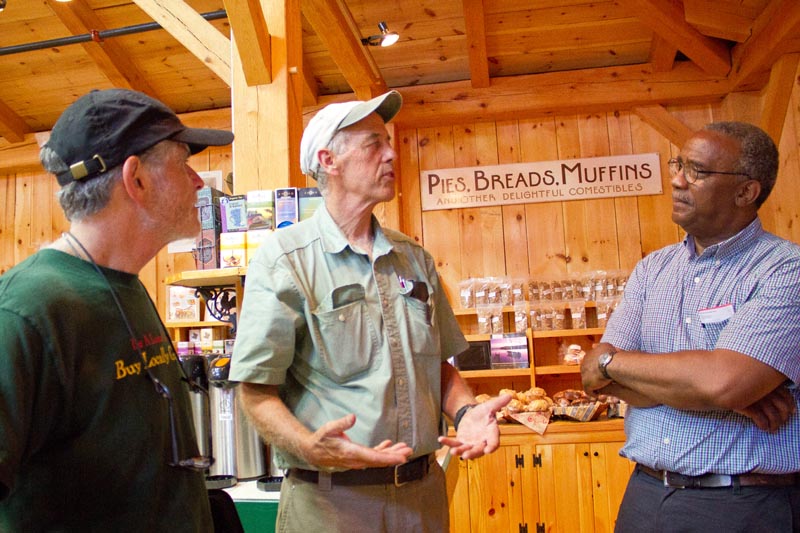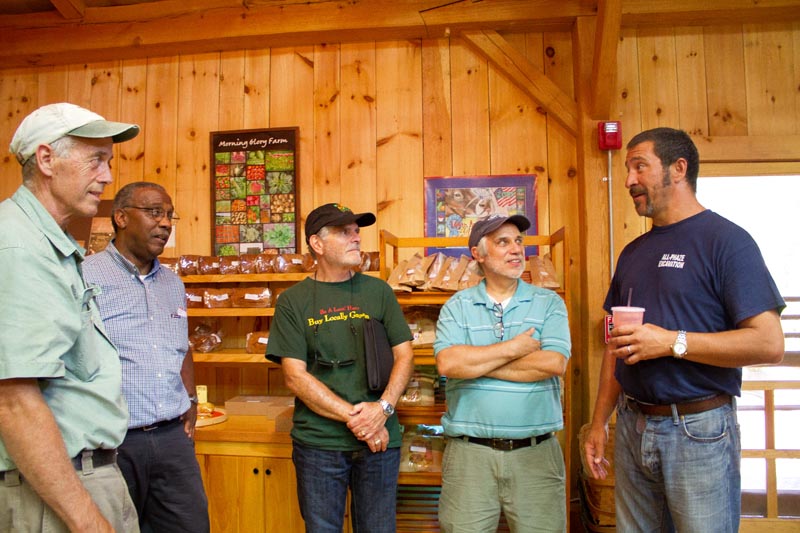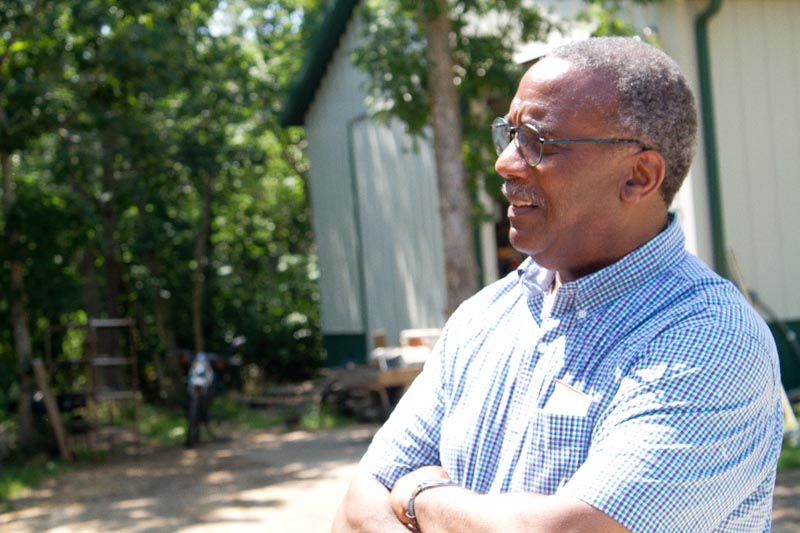On any given summer afternoon, the stand at Morning Glory Farm in Edgartown is bustling. Shoppers leave with large totes of fresh vegetables, still warm from being picked just across the street. For new Massachusetts Department of Agricultural Resources commissioner Greg Watson, the stand reflects the changing face of the country’s farming movement, one where consumers aren’t left behind but are active participants in the changing of their food system.
“I’ve always known that on the Vineyard there really is this dynamic, in terms of the relationship between the consumers and the community. And that to me is very special,” Mr. Watson said. “I’m very excited about it.”
On a whistle-stop tour of the Island on Tuesday, Mr. Watson visited the Edgartown School garden to learn about the Island Grown Schools program, followed by a tour of Morning Glory Farm with owners Jim and Debbie Athearn, where he had lunch with local food advocates and farmers from the Vineyard community. Later in the day he also toured Beetlebung Farm and Allen Farm in Chilmark.
Throughout the day he spoke of the Vineyard as a model for other small-scale farm communities in the state, and emphasized the importance of collaboration between farmers, consumers, retailers and state and local government.
Mr. Watson, who lives in Falmouth, was appointed commissioner by Gov. Deval Patrick in April. This is Mr. Watson’s second time serving as state commissioner, overseeing agriculture and forestry services in the state; Mr. Watson held the same title in the early 1990s.
“It’s a great time to be back, there’s so much going on and so much is brand-new,” he said.
Morning Glory Farm has seen much of those changes and at times been at the forefront of the movement, most recently building a wind turbine right behind the stand. The 50-kilowatt hour turbine now produces 75 per cent of the farm’s energy. They’ve also chosen an alternative to certified organic, coining the term “morganic” (Morning Glory organic) on many of their crops across the Island. Morganic crops are grown using the National Organic Standards; however the farm has chosen not to become certified.
Mr. Athearn’s reasons for using their own system go beyond the cumbersome paperwork associated with certification, he said.
“My personal philosophy is more toward, ‘I know what I’m doing and I can tell my neighbors what I’m doing, I don’t need to be certified,’” he said. “If I was shipping and needed a guarantee for someone who didn’t know me, that’s where certification would come in. We tell our customers as well as we can with signage.”
Mr. Watson said his department is working with growers to develop best growing practices for their sector in the areas of vegetable, forest products and aquaculture, called Commonwealth Quality, a branded label certification. The best management practices act as an assurance to the farmer and consumer that the product was grown safely and sustainably, even if it is not grown organically, and can act as an alternative to the heavy paperwork that sometimes deter farmers from becoming organically certified.
“In essence what people are looking for is trust. That’s it, right?” Mr. Watson asked as he headed to the high-tunnel tomatoes. He stopped and peered into a long row of ripening tomatoes.
“That’s what our customers tell us,” Mrs. Athearn replied.
Mr. Watson said farms selling their products through direct market retail — via farm stands and markets — takes the middle man out of the equation. And a movement is growing around it.
“There is a revolution going on and I don’t even think it’s slow — we are changing the food system,” he said. “There is no question, it’s not what it was 30 or 40 years ago.”
He continued: “It’s being changed and there is a partnership — consumers are really much more in tune with what farming is and the importance of locally grown and they can become advocates . . . there’s more of a cooperative arrangement around the community-supported agriculture, farmers’ markets. I’m sure you’ve got the most loyal customers among others who come here.”
Past the blueberry bushes and into the back, where the farm keeps their tool shed, emerged Mr. Athearn’s son, Simon. Simon and his brother Daniel have taken on managerial roles in recent years, but that wasn’t always the case, Mrs. Athearn said.
“They made it very clear that was not their intention,” she said.
“Having the very clear option that they never forced it on us . . . it’s got to come naturally,” Simon Athearn said. “It made it very easy.”
“I guess you could say it grew on you, right?” Mr. Watson said to the laughing group.
Mr. Athearn recalled a moment on the farm with young Simon.
“When Simon was four years old, we were picking for the farmers’ market at 6 a.m. He was picking up lettuce as I cut it and placed it in the garden cart . . . I said Simon, ‘you’re doing that very well, you’re being very gentle and not breaking any leaves off’. He held up his hands and said, ‘these are farmer hands’.”
Mr. Athearn led them past the family’s first field, which now holds a booming crop of winter squash, and stopped at the old dairy barn where the family once sold raw milk out of the back door.
“I built it because I thought I wanted to be a dairy farmer. That’s the way I understood New England farming to be and I wanted to be a New England farmer,” Mr. Athearn said. “It never went anywhere. We started selling zucchinis and sweet corn, and people were demanding more and more.”
After the tour, it was time to feast in true Morning Glory Farm tradition. Mr. Watson was joined by members of the Vineyard food and farm community for a round table discussion, including representatives from the Island Grown Initiative, farmers, eaters and chefs for salads, zucchini bread and much needed lemonade after a morning in the sun.
Noli Taylor, director of the Island Grown Schools program, spoke of the gleaning program. The Athearns have been generous in their support of Island Grown Initiative’s gleaning program, hosting volunteers to harvest surplus crops that go to school cafeterias, elderly housing and the jail, among other outlets. Last year the gleaners harvested 22,000 pounds of vegetables that would have otherwise been discarded.
Mr. Watson was speechless.
“That’s amazing . . . when you talk about the amount and how much of it would have just been plowed under, it’s just amazing,” he said.
Mr. Watson was also intrigued by the idea of a slaughterhouse on the Island, especially with the growing demand for locally-raised meat across the state. Locally-raised meat has boomed in recent years, farmer and slaughterhouse leader Richard Andre said. Several years ago, no meat birds such as chickens were being raised on the Vineyard; this season there are close to 10,000, said Mr. Andre. While they do not expect to have the same reaction to four-legged animals, Mr. Andre said he did expect the 500 animals now being raised on the Island to double if a slaughterhouse were built here. Mr. Andre said it would be an economic boost for the Vineyard.
“For us, if we raise our animals and we bring them off-Island to slaughter in May, that means we’re not getting our meat back until a lot of our market is gone [six to eight weeks later],” Mr. Andre said.
As lunch guests began to leave, Mr. Watson took a moment with Ms. Taylor to reiterate the importance of small farms and their role in the Vineyard community.
“Small-scale agriculture is the most economical, efficient way . . . The thing that makes it work is when you start to see the small scale work with community support and there’s this incredible reciprocity; you can really see things happen . . . There’s something very special happening here.”







Comments (1)
Comments
Comment policy »